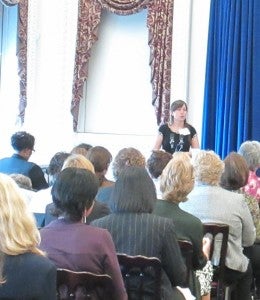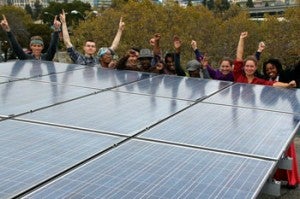This commentary, authored by Katie Walsh, originally appeared on EDF Climate Corps.
 After an incredible week of EDF Climate Corps Training last month, I had the opportunity to speak at the White House for an inaugural one-day summit on Women, Climate and Energy organized by the U.S. Department of Energy and the White House Office of Public Engagement.
After an incredible week of EDF Climate Corps Training last month, I had the opportunity to speak at the White House for an inaugural one-day summit on Women, Climate and Energy organized by the U.S. Department of Energy and the White House Office of Public Engagement.
I joined a distinguished group of 100 women from business, research, government and the nonprofit sector to discuss our work in climate and energy. I provided the closing address highlighting the need to bridge silos by opening up our climate change ‘narratives’ to better engage diverse audiences as well as use tactics that push the envelope on climate change action.
Debating Solutions – Not Science
Newly appointed Energy Secretary Ernest Moniz opened the summit with a statement that I couldn’t agree with more: “I’m not here to debate the undebatable; climate change is real and urgent and science demands a prudent response. Now the question is: what are the solutions? This is the legitimate debate; let’s debate the solutions, as opposed to the drivers.” On top of the list of solutions he noted the Obama Administration working on is energy efficiency – in buildings, appliances, vehicles and the industrial sector. Efficiency gains provide win-win solutions. An example is the more than $2 trillion dollars to be saved from appliance standards revisions along with the associated carbon emission reductions. Another example is the $1.2 billion in energy efficiency savings EDF Climate Corps fellows have identified in that last 5 years. Read More


